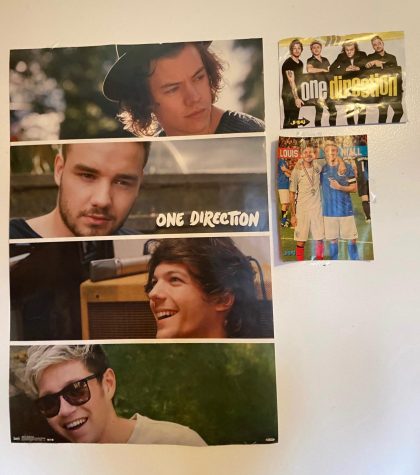Teenage Fangirls and Their Role in the Music Industry
April 23, 2021
Teenage girls are consistently a powerful force within the music industry with their support skyrocketing the careers of artists like The Beatles, NSYNC, One Direction, 5 Seconds of Summer (5SOS) and Taylor Swift to superstardom. However, teenage girls’ influence in the industry doesn’t come without a cost as they and their interests are under constant public scrutiny.
While becoming a fan of an artist may seem like a very basic process, for teenage girls, the process is much more complicated.
Becoming a fan means taking on the stigma that comes with liking the artist, learning to feel comfortable being labeled as a fangirl and having to continuously justify their interest in the artist.
For Katelyn Karner, senior, becoming a public One Direction fan meant becoming more comfortable with herself and learning to accept the preconceptions that came with liking them.
“When I was little I pretended I hated [One Direction] during the root of my tomboy phase because I was seeking validation from males in my life and I didn’t want to be labeled as a fangirl type personality,” said Karner.

Daniela Mejia, senior, also struggled with being a public fan of an artist with a large teenage girl following. Mejia kept her support of Taylor Swift under wraps at first, so she wouldn’t be judged.
“I feel like for a while I would never have bought any [Taylor Swift] merch. I didn’t want to broadcast [my support for her] because I was like, ‘people probably think I’m weird.’ I didn’t want to be exactly categorized as a Swiftie,” said Mejia.
Kiara Sheetz, junior, had a very similar experience to Karner and Mejia as she tried to keep her support for 5SOS “on the down-low,” and only had a few friends who knew she was a fan for a while.
For teenage girls, there is a very fine line between being considered a fan versus a fangirl. It’s often this unclear distinction that scares girls from showing their full support for an artist in public.
Many misconstrue fangirl to mean crazy, and often if a girl is considered a fangirl, people start to see it as one of her most prominent personality traits.
The crazed fangirl phenomenon can be traced back to Elvis and The Beatles whether performing on the Ed Sullivan Show for crowds of screaming girls or simply departing a plane to find thousands of girls waiting for them at the airport. Repeated images of teenage fangirls crying and fainting cements the concept of these girls as frivolous rather than holding a real appreciation for the music.
So today, girls often dilute their support for an artist in public, so they won’t be seen as the screaming, crying, wheeled off in an ambulance fangirl. This fear of judgment leads girls to distance themselves from artists they admire in order to not be perceived as the stereotypical fangirl.
Around the release of her album “Reputation,” many people turned against Taylor Swift. She got a lot of hate, and people began to label her as “basic.”
During this time, Mejia would play down her support for Swift, so she wouldn’t be judged by others.
The idea of being seen as not cool for liking an artist was also very true for One Direction fans.
“At one point in middle school, I had this sweater; I still have it, it says ‘I love One Direction’ on it. And I got made fun of a little bit for it. And so I didn’t really wear it to school after that, because I thought people were gonna judge me,” said Sheetz.
Teenage girls have recently become even more aware of the ways in which society judges them. There was a trend on TikTok not so long ago where people were challenged to name something teenage girls could like without being judged or being made fun of. TikTok users were unsuccessful in completing the challenge, and as a result, teenage girls quickly realized the harsh reality of the constant scrutiny they are subjected to.
“Whatever you do, people are gonna hate you. Like, ‘Oh, I like Taylor Swift.’ ‘So basic.’ Or ‘Oh, I don’t.’ ‘Oh, my God, like, You think you’re so cool,’” said Mejia.
Even girls within fandoms find themselves judging other fandoms and artists.
Karner said, “Even though I was a fan of One Direction, I still fell victim to labeling teenage girls. With Taylor Swift and with her fans, I was like, ‘oh, Taylor Swift just writes about all of her exes, and she’s not that good.’ But no Taylor Swift is one of the best songwriters ever.”
It’s very common for people to invalidate teenage girls’ feelings, hobbies and interests. The invalidation of boy bands is a natural extension to the invalidation of girls themselves.
“I think because the whole idea of a boy band is just kind of poked fun at constantly. You’re starting off with a teenage fan base. People are going to try to invalidate those girls and being fans of you and saying that ‘they just like you because of your looks, they’re just crazy, they’re just hormonal.’ They’re going to say, ‘you don’t really make good music.’ Even if you do write all of your own songs,” said Karner.

Whether it’s Justin Timberlake emerging from NSYNC to become one of the most recognized solo artists in the industry or the varied successful solo careers of each of the members of One Direction, their talent can not be denied. These artists graduate from boy bands and go on to release solo albums, perform at Super Bowls and win Grammy awards.
Although the interests of teenage girls are often belittled, they must be doing something right because teenage girls were some of the first to support some of the most successful artists in the industry.
“People totally invalidate that teenage girls made the Beatles famous. Now, I’m not saying completely, that One Direction is as talented as the Beatles. But I’m saying that the fan base was the same, and during the 60s teenage girls were invalidated the same way now, and now old men love the Beatles and will fight for them till their death. There’s no reason that a teenage girl needs to be judged for liking One Direction when it’s literally the exact same thing,” said Karner.
A common trend between the Beatles, One Direction, 5SOS and Taylor Swift seems to be that they become more widely accepted as they age.
“I’m definitely more comfortable showing my support for [5SOS] now. Because I mean, I can wear sweatshirts or merch to school without people hating on me or whatever. And I can listen to music and I’ve even gotten some of my friends into it too,” said Sheetz.

One Direction celebrated their ten-year anniversary on July 23, 2020. While the band is still on “hiatus,” the anniversary brought back a lot of nostalgia for their fans. Time apart and the nostalgia of their old days as a band, has recently created a resurgence in One Direction’s popularity.
“I think that obviously, things come back into style, no matter what it is, whether it’s clothes or different music. You see people walking around with vintage NSYNC t-shirts on, and it’s just cool and nobody really makes fun of them for that. I don’t think that One Direction is quite there yet. It’s gonna be something that when we’re older, if I wore like a vintage One Direction t-shirt, it would be cool,” said Karner.
While teenage girls and their interests are still subjected to public scrutiny, with the emergence of social media, girls have found communities online where they can freely express their support for artists and bond with other fans.
“I think social media gives you an outlet where you see a lot of people that share your interests. I think that’s helped me because I think before it was kind of like, ‘literally no one likes Taylor Swift.’ My parents sometimes, when I’m listening to a song and I’m freaking out, they’re like, ‘Oh, my God, you’re like, literally crazy.’ But I’m not the only one like this. Like, ‘do you want to see this video from yesterday? Everyone’s like this.’ That kind of makes me feel seen because there are other people who are like this too. So it makes me feel more like accepting of it,” said Mejia.
Fans not only have found validation from fellow fans, but from the artists themselves.
“I think that girls choose to like these groups, One Direction, Taylor Swift, 5SOS, because they are aware that their audiences are primarily young women and a lot of times they play into that. I mean Taylor Swift is a feminist icon. I feel like while they’re getting criticized by the rest of society for liking this group, they hold strong because they’re getting validated by the artist,” said Karner.


